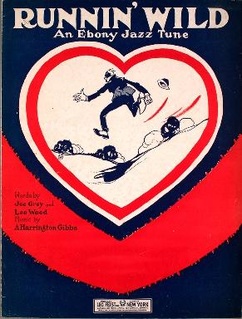Related Research Articles
"Thinking of You" is a popular song, composed by Harry Ruby with lyrics by Bert Kalmar. It was introduced in the Broadway show, The Five O'Clock Girl (1927) when it was sung by Mary Eaton and Oscar Shaw.
"A Fine Romance" is a popular song composed by Jerome Kern with lyrics by Dorothy Fields, published in 1936.
"Somebody Loves Me" is a popular song, with music written by George Gershwin, and lyrics by Ballard MacDonald and Buddy DeSylva. This is not to be confused with the Southern gospel song written by W.F. & Marjorie Crumley. The song was published in 1924 and featured in George White's Scandals of 1924.
"I Gotta Right to Sing the Blues" is a popular song with music by Harold Arlen and lyrics by Ted Koehler, published in 1932 for the Broadway show Earl Carroll's Vanities (1932). The song has become a jazz and blues standard. Popular recordings in 1933 and 1934 were those by Cab Calloway, Louis Armstrong and Benny Goodman.
"Everything I Have Is Yours" is a popular song.
"I Wished on the Moon" is a song composed by Ralph Rainger, with lyrics by Dorothy Parker. Bing Crosby sang the song in The Big Broadcast of 1936.
"The Lamp Is Low" is a popular song of the 1930s. The music was written by Peter DeRose and Bert Shefter, adapted from Pavane pour une infante défunte, a piece by Maurice Ravel. The lyrics were written by Mitchell Parish.
"Cheerful Little Earful" is a 1930 song composed by Harry Warren, with lyrics by Ira Gershwin and Billy Rose. It was written for the musical Sweet and Low (1930). Actress and singer Fanny Brice, who was married to Billy Rose at the time, starred in Sweet and Low, where she and George Jessel sang the song.The actress Hannah Williams was known in particular for the song, "Cheerful Little Earful" in which she also performed in the Broadway production of Sweet and Low.
"I'm Putting All My Eggs in One Basket" is a popular song written by Irving Berlin for the 1936 film Follow the Fleet, where it was introduced by Fred Astaire and Ginger Rogers. Astaire had a huge hit with the song in 1936 and other popular versions that year were by Jan Garber and by Guy Lombardo.
"Why Was I Born?" is a 1929 song composed by Jerome Kern, with lyrics written by Oscar Hammerstein II.
"Mean to Me" is a popular song with music by Fred E. Ahlert and lyrics by Roy Turk, published in 1929. Hit versions that year were by Ruth Etting and by Helen Morgan.
"I Can't Get Started" is a popular song, with lyrics by Ira Gershwin and music by Vernon Duke (1936), that was first heard in the theatrical production Ziegfeld Follies of 1936 where it was sung by Bob Hope to Eve Arden.
"(In My) Solitude" is a 1934 jazz standard composed by Duke Ellington with lyrics by Eddie DeLange and Irving Mills.
"Them There Eyes" is a jazz song written by Maceo Pinkard, Doris Tauber, and William Tracey that was published in 1930. One of the early recorded versions was performed by Louis Armstrong in 1931. It was made famous by Billie Holiday, who recorded her version in 1939 for Vocalion Records. A version by Emile Ford & The Checkmates reached number 18 on the UK Singles Chart in 1960.
"What Can I Say After I Say I'm Sorry?" is a popular song by Walter Donaldson and Abe Lyman, published in 1926.
"If I Should Lose You" is a song composed by Ralph Rainger, with lyrics by Leo Robin. It was introduced in the 1936 film Rose of the Rancho.
"Please Be Kind" is a 1938 American song composed by Saul Chaplin with lyrics by Sammy Cahn. Popular recordings that year were by Mildred Bailey and the Red Norvo Orchestra; Bob Crosby & His Orchestra ; and by Benny Goodman & His Orchestra.

"Runnin' Wild" is a popular song first composed and recorded in 1922, written by Arthur Harrington Gibbs with lyrics by Joe Grey and Leo Wood.
"'Deed I Do" is a 1926 jazz standard composed by Fred Rose with lyrics by Walter Hirsch. It was introduced by vaudeville performer S. L. Stambaugh and popularized by Ben Bernie's recording. It was recorded by influential clarinetist and bandleader Benny Goodman as his debut recording in December 1926 with Ben Pollack and His Californians. Ruth Etting's rendition of the song became a top ten hit in 1927 as did the version by Johnny Marvin.
Moanin' Low is a popular torch song. The music was written by Ralph Rainger; the lyrics by Howard Dietz. The song was published in 1929 and was introduced that same year in the musical revue The Little Show by Libby Holman becoming a hit and Holman's signature song. A recording by The Charleston Chasers was also popular in 1929.
References
- ↑ Clarke, Donald (2002). Billie Holiday: Wishing On The Moon. New York: Da Capo Press. p. 117. ISBN 0306811367.
- ↑ Whitburn, Joel (1986). Joel Whitburn's Pop Memories 1890-1954 . Wisconsin, USA: Record Research Inc. p. 595. ISBN 0-89820-083-0.
- ↑ "The Online Discographical Project". 78discography.com. Retrieved February 23, 2018.
- ↑ "The Online Discographical Project". 78discography.com. Retrieved February 23, 2018.
- ↑ "Peggy Lee Discography". Peggy Lee Discography. Retrieved February 23, 2018.
- ↑ "The Online Discographical Project". 78discography.com. Retrieved February 23, 2018.